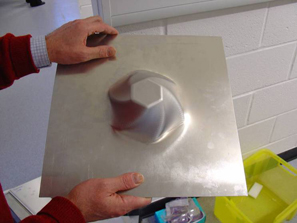Most manufacturing involves 'adding to' or 'removing from' a material. Dr Julian Allwood and Doctoral Student Kathryn Jackson are working on a unique manufacturing process which reforms material into a new shape.
Incremental Sheet Forming (ISF) is an alternative to metal pressing or stamping. Pressing requires specialist tooling for each product, which is expensive and difficult to design. This means, in turn, that pressing requires large batch volumes to offset tooling costs. In incremental sheet forming, an indentor tracks round the work piece, creating small 'kinks' in the material, incrementally developing any chosen shape. This leads to lower production rates, but no tooling costs, and is potentially an attractive solution for flexible low-volume manufacturing.
Possible applications include: providing any car body part from a stock of standard sheets, greatly reducing the need for mass distribution of spares and offering a solution when spares are not available; custom-made medical braces such as ankle supports; and bespoke architectural features.

ISF was first explored at the Institute for Manufacturing in 1990 by Colin Andrew, and then taken up in Japan during the 1990s. Most studies in ISF to date have been with one indenter only, and based around modified Computer Numerical Control (CNC) milling machines. A new incremental forming machine was commissioned in October 2004 at the Department's Institute for Manufacturing, which is the first dedicated rig to be built outside Japan. The machine is designed to be strong enough to form steel of the thickness used for car body panels. Additional features of the machine include built-in force measurement and space to accommodate a second indenter on the underside of the work-piece in the future.

